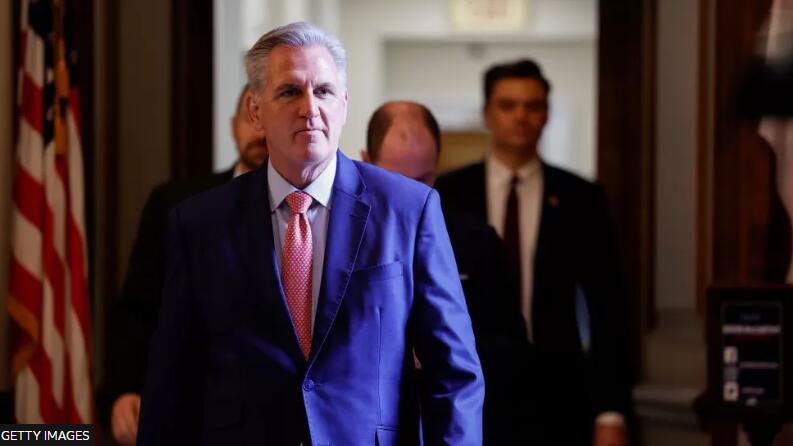Kevin McCarthy struggles for support ahead of Speaker vote
Republican Kevin McCarthy is struggling to secure enough support to ensure he wins a vote to become the new Speaker of the House of Representatives.
The Californian congressman must win a majority vote in the House on Tuesday to get the role.
But a group of Republicans are refusing to back him, despite him making a number of last-minute concessions.
Mr McCarthy cannot afford to lose more than a handful of votes from his party if he is to win the vote.
The role of Speaker of the House is one of the most important jobs in US politics.
They control the legislative agenda and timetable in the House, as well as who sits on various committees.
Failure to win the speakership on the first attempt could therefore weaken both Mr McCarthy and the Republicans’ credibility, hampering House Republicans’ plans of acting quickly to investigate the Biden administration as well as President Joe Biden’s son, Hunter Biden.
How did we get here?
In November’s mid-term elections, the Republican Party narrowly secured control of the House of Representatives (the lower chamber of the US Congress) from the Democrats, winning 222 of the 435 seats.
Following the result, the Republican Party’s leader, Mr McCarthy, ran to be the party’s candidate for the new Speaker, and won with 188 votes.
Since then, he has been working to gain the support of Republicans ahead of the opening of the new Congress on Tuesday, when the vote will take place. 35 new US senators will also be sworn into the Senate.
If Mr McCarthy wins, he will replace Democrat Nancy Pelosi as Speaker of the House.
But some right-wing Republicans are refusing to support him, making his bid for the speakership less certain.
The narrowness of the Republicans’ majority in the House means that Mr McCarthy can only afford to lose four of their votes if he is to secure a majority of 218 and secure the position of speaker.
No Democrats are likely to vote for him.
Why are some Republicans refusing to back him?
Those who oppose Mr McCarthy’s bid for the speakership are Trump-supporting hardliners, dubbed the “Never Kevins” by some.
They include representatives Bob Good and Matt Gaetz, who believe Mr McCarthy represents too much of the mainstream and the establishment.
“I won’t be voting for Kevin McCarthy tomorrow. He’s part of the problem. He’s not part of the solution,” Mr Good told Fox News on Monday. “There’s nothing that indicates to me that he’s going to change his pattern since he’s been in leadership, where he’s part of the swamp cartel.”
“I think he’s just a shill of the establishment,” said Mr Gaetz in an interview with the Daily Caller website last week. “I think that Kevin McCarthy is little more than a vessel through which lobbyists and special interests operate.”
Some may also remain wary of his previous stance towards former President Donald Trump following the Capitol riots in 2021, having originally been critical of the then-President, who he said bore responsibility for the attack.
What concessions has Mr McCarthy made?
Despite the opposition, Mr McCarthy said he remained confident he would win Tuesday’s vote. “I think we’re going to have a good day tomorrow,” he told reporters on Monday.
But he has had to make a number of concessions in order to try to win over Republicans who remain opposed to him or who remain on the fence.
One of the key demands Republicans have been asking for would make it easier for a small number of representatives to challenge his role as Speaker – weakening his own position in the House.
Mr McCarthy initially refused to acquiesce to the demand. But with time running out to win opposing Republicans over, he unveiled a package of rule changes on Sunday, including changes to how the Speaker could be removed. The concession means that any five Republican party members can call for the Speaker’s removal at any time.
These, however, did not satisfy some right-wing Republicans he was attempting to win over.
A letter released on Sunday, signed by nine Republicans, said Mr McCarthy’s concessions come “almost impossibly late to address continued deficiencies”.
“Thus far, there continue to be missing specific commitments with respect to virtually every component of our entreaties, and thus, no means to measure whether promises are kept or broken,” it said.
What happens if no one wins a majority?
No business can be undertaken within the House – not even the swearing in of new members of Congress – until a candidate has been chosen.
So if Mr McCarthy does not win the first vote, members of the House will keep taking part in successive votes until someone wins a majority.
Mr McCarthy has vowed to fight on even if he does not win immediately. And there is no other obvious candidate who could viably challenge for the speakership.
But having to hold more than one vote to decide on the speaker would be embarrassing – not only for Mr McCarthy, but for the Republican party too.
No other candidate running for the speakership for the first time has failed to win in the first vote for over 100 years, so such a failure could weaken the Republicans’ credibility within the House.
